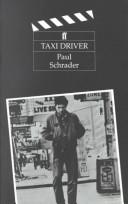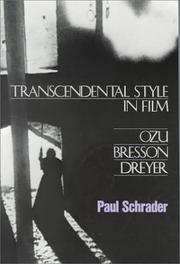| Listing 1 - 10 of 32 | << page >> |
Sort by
|

ISBN: 0571202152 Year: 1990 Publisher: London Faber and Faber
Abstract | Keywords | Export | Availability | Bookmark
 Loading...
Loading...Choose an application
- Reference Manager
- EndNote
- RefWorks (Direct export to RefWorks)

ISBN: 0306803356 Year: 1988 Publisher: New York, N.Y. : Da Capo Press,
Abstract | Keywords | Export | Availability | Bookmark
 Loading...
Loading...Choose an application
- Reference Manager
- EndNote
- RefWorks (Direct export to RefWorks)
Paul Schrader --- twintigste eeuw --- film --- filmtheorie --- filmgeschiedenis --- Ozu Yasujiro --- Bresson Robert --- Dreyer Carl Theodor --- film en religie --- 791.41 --- 791.43 --- Ozu, Yasujiro --- Dreyer, Carl-Theodor --- Bresson, Robert --- Ozu, Yasujirō, --- Dreyer, Carl Theodor, --- Motion pictures --- Aesthetics. --- Criticism and interpretation. --- Aesthetics --- Ozu, Yasujirō, --- Ozuyasu, --- 小津安二郎, --- Film --- 小津 安二郎, --- おづ やすじろう, --- オヅ ヤスジロウ, --- Одзу, Ясудзиро, --- Odzu, I︠A︡sudziro, --- Komiya, Shūtarō, --- Maki, James --- Schwartz, Ernst, --- 小津, 安二郎 --- Dreyer, Carl Theodor
Book
ISBN: 0520969146 9780520969148 9780520296817 0520296818 9780520296817 Year: 2018 Publisher: Oakland, California
Abstract | Keywords | Export | Availability | Bookmark
 Loading...
Loading...Choose an application
- Reference Manager
- EndNote
- RefWorks (Direct export to RefWorks)
With a new introduction, acclaimed director and screenwriter Paul Schrader revisits and updates his contemplation of slow cinema over the past fifty years. Unlike the style of psychological realism, which dominates film, the transcendental style expresses a spiritual state by means of austere camerawork, acting devoid of self-consciousness, and editing that avoids editorial comment. This seminal text analyzes the film style of three great directors-Yasujiro Ozu, Robert Bresson, and Carl Dreyer-and posits a common dramatic language used by these artists from divergent cultures. The new edition updates Schrader's theoretical framework and extends his theory to the works of Andrei Tarkovsky (Russia), Béla Tarr (Hungary), Theo Angelopoulos (Greece), and Nuri Bilge Ceylan (Turkey), among others. This key work by one of our most searching directors and writers is widely cited and used in film and art classes. With evocative prose and nimble associations, Schrader consistently urges readers and viewers alike to keep exploring the world of the art film.
Motion pictures --- Aesthetics --- Aesthetics. --- Dreyer, Carl Theodor, --- Bresson, Robert --- Ozu, Yasujirō, --- Ozuyasu, --- 小津安二郎, --- 小津 安二郎, --- おづ やすじろう, --- オヅ ヤスジロウ, --- Одзу, Ясудзиро, --- Odzu, I︠A︡sudziro, --- Komiya, Shūtarō, --- Maki, James --- Schwartz, Ernst, --- Criticism and interpretation. --- 小津, 安二郎 --- Ozu, Yasujirō, --- Dreyer, Carl Theodor --- andrei tarkovsky. --- art classes. --- associations. --- austere camerawork. --- bela tarr. --- carl dreyer. --- common dramatic language. --- directors. --- divergent cultures. --- editorial comments. --- film styles. --- nuri bilge ceylan. --- psychological realism. --- robert bresson. --- self consciousness. --- slow cinema. --- spiritual state. --- theo angelopoulos. --- transcendental style. --- world of the art film. --- writers. --- yasujiro ozu.
Film
Year: 2014 Publisher: [Lieu de publication inconnu]: Metropolitan filmexport,
Abstract | Keywords | Export | Availability | Bookmark
 Loading...
Loading...Choose an application
- Reference Manager
- EndNote
- RefWorks (Direct export to RefWorks)
Film
Year: 2000 Publisher: [Lieu de publication inconnu]: [éditeur inconnu],
Abstract | Keywords | Export | Availability | Bookmark
 Loading...
Loading...Choose an application
- Reference Manager
- EndNote
- RefWorks (Direct export to RefWorks)
L'écrivain, artiste, acteur, homme politique le plus célèbre du Japon, Yukio Mishima surnommé le Kamikaze de la beauté , se réveille le 25 novembre 1970. Il a 45 ans, s'apprête à se suicider dans la grande tradition Samouraï Hara-kiri. Avant de commettre cet acte ultime, il se remémore sa vie, faite de traumatismes, de passion. Réalisé par le grand Paul Schrader, scénariste de Taxi Driver (et de plusieurs autres Scorsese, dont Raging Bull), produit par Francis Ford Coppola, George Lucas, magnifié par une des meilleures compositions de Philip Glass (The Hours, Candy Man), MISHIMA est un biopic sublime, passionnant qui, à travers l'histoire du célèbre écrivain éponyme (l'auteur de Confessions d'un masque), dévoile toute l'histoire du Japon moderne.
Book
Year: 1972 Publisher: Berkeley: University of California press,
Abstract | Keywords | Export | Availability | Bookmark
 Loading...
Loading...Choose an application
- Reference Manager
- EndNote
- RefWorks (Direct export to RefWorks)
Book
Year: 1972 Publisher: Berkeley University of California press
Abstract | Keywords | Export | Availability | Bookmark
 Loading...
Loading...Choose an application
- Reference Manager
- EndNote
- RefWorks (Direct export to RefWorks)
Film
ISBN: 0788617354 Year: 2013 Publisher: [place of publication not identified] IFC
Abstract | Keywords | Export | Availability | Bookmark
 Loading...
Loading...Choose an application
- Reference Manager
- EndNote
- RefWorks (Direct export to RefWorks)
Film
Abstract | Keywords | Export | Availability | Bookmark
 Loading...
Loading...Choose an application
- Reference Manager
- EndNote
- RefWorks (Direct export to RefWorks)
Film
Year: 2020 Publisher: [place of publication not identified] Powerhouse
Abstract | Keywords | Export | Availability | Bookmark
 Loading...
Loading...Choose an application
- Reference Manager
- EndNote
- RefWorks (Direct export to RefWorks)
| Listing 1 - 10 of 32 | << page >> |
Sort by
|

 Search
Search Feedback
Feedback About UniCat
About UniCat  Help
Help News
News